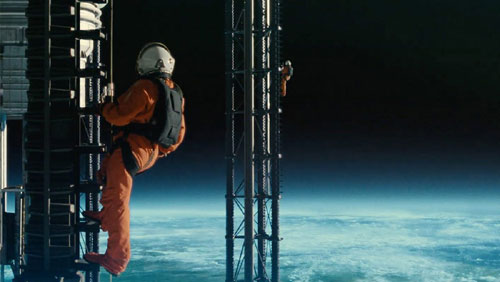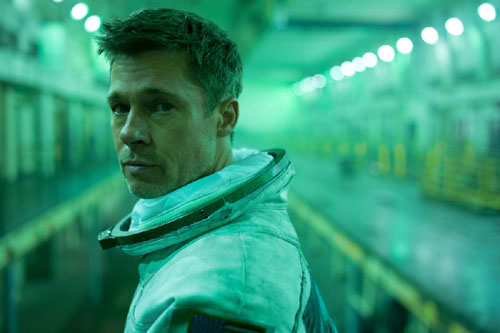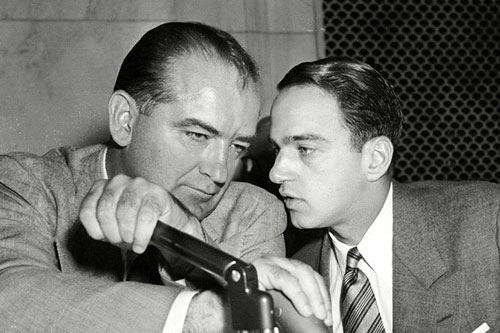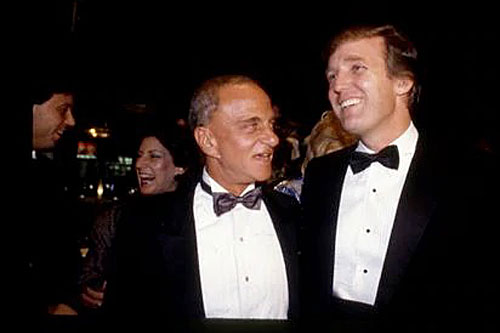Movies about outer space generally fall into
three categories. The first, and by far the most popular, is the space adventure; some of the most durable franchises in cinematic history—Star Wars, Star Trek, Guardians of the Galaxy—belong under this heading. The second is comprised of histories of the space program and true stories of astronauts—The Right Stuff, Apollo 13, First Man. The third category, more cerebral and also more demanding of the
patience of audiences than the others, can best be described as an inner voyage. The protagonists travel through the vast expanses of space, seeking not to confront their enemies but the nature of the universe and the quality of being human. Films as disparate as 2001: A Space Odyssey, Solaris, Gravity, The Martian, Interstellar andContact can be considered part of this category. The latest such film, James Gray’s Ad Astra, forces
its lead character, Maj. Roy McBride (Brad Pitt), to face unprecedented galactic dangers created by his own father (Tommy Lee Jones). Inherent to McBride’s quest is a reconsideration of his own existence, the code of duty he has lived by all his life, and whether that code is as valid as he always believed it was. 
Ad Astra is set in the indeterminate near future. Maj. McBride’s superiors call him to a top secret meeting about mysterious power surges emanating from outer space. The surges have already killed thousands of people, and threaten the extinction of all life on the planet. McBride gets the shock of his life when his superiors tell him that the
surges have been traced to “Project Lima,” a space mission that left for Neptune 27 years before, led by McBride’s father, to search the Universe for signs of intelligent life. McBride’s mission is to head for Neptune, find his apparently still-living father, and persuade him to stop the surges. The journey ahead of McBride is in several stages. The first part is
banal; by this time there are commuter flights to the moon, just like on Earth, up to and including the Subway sandwich shop awaiting new arrivals. However, the rest of the trip—without giving away plot points—is arduous, both physically and mentally. Except for Dr. Pruitt (Donald Sutherland), an old colleague of his father’s, and Helen Lantos (Ruth Negga), director of the operations center on Mars, McBride has
little meaningful contact with any other people. His journey reminds us of the adage about war: “Boredom punctuated by moments of sheer terror.” The terror sequences work superbly, all the more for being infrequent. (No fair saying what they are; they need to catch you by surprise just as much as they do McBride.) Unfortunately, some viewers have felt the boredom more; Ad Astra received an 83% rating from critics on the
Rotten Tomatoes website, but only a 40% audience rating. (One of my friends called the movie “a snoozefest.”) Personally, I found Ad Astra subtle, hypnotic, and in the end deeply moving. The film is absolutely persuasive visually, thanks to Gray, cinematographer Hoyte Van Hoytema, production designer Kevin Thompson, film editors John Axelrad and Lee Haugen, and an
extraordinary team of special effects artists. Yet the power surges and the voyage to Neptune are the McGuffins in Ad Astra; the real story is in McBride’s constant interior monologues, as he slowly comes to question everything he has ever believed about his father, himself, and what it takes to be a man. We see at the beginning how McBride has lived according to the rigid code taught to him by his father and
reinforced by the military. The opening montage shows us how much this has cost him, including his wife (Liv Tyler) walking out on him. The true voyage in Ad Astra is the one McBride takes in his mind and heart; finally, it is the story of a brave man who finally has the courage to change. 
Gray needed a lead actor who is a master of subtle shadings of emotion, and he found one in Brad Pitt. Pitt—who was also one of Ad Astra’s producers—has had a magnificent 2019. He has been a welcome screen presence since his breakthrough performance in Thelma and Louise nearly 30 years ago. But although I’ve always found him reliably good, his performances this year in Once Upon a Time…in Hollywood and Ad
Astra were something else again. As Cliff Booth in Once Upon a Time, Pitt stole the movie with his breezy, good-natured bravado—an amalgam of every self-deprecating screen hero from Errol Flynn to Jackie Chan. Pitt’s Roy McBride is an almost complete reversal from Cliff Booth; McBride’s heroism weighs heavily upon him. Despite the outer space films that preceded Ad Astra, the film
uppermost in my mind while I watched it was American Sniper, Clint Eastwood’s biopic of legendary Navy SEAL Chris Kyle. Kyle, played by Bradley Cooper, was brought up to think of himself as a sheepdog guarding the sheep from the wolves, and that standard of vigilance carried through his entire life. Kyle had contempt for any of his comrades who slacked off for a split second, yet Eastwood presents evidence that Kyle suffered for never slacking off. Ad Astra takes that
thought further, arguing that McBride is a greater hero and a better man in the end for “slacking off.” Chris Kyle might have sneered; the rest of us will not. It is ironic that Matt Tyrnauer released Where’s My Roy Cohn?, his biographical documentary about the late New York attorney and political fixer, the same weekend as Ad Astra. Roy Cohn was a much
different and much less admirable man than either the real-life Kyle or the fictional McBride. But for people of a certain ideological bent, Cohn is necessarily a greater hero than Kyle and McBride combined. Where’s My Roy Cohn? is a straightforward documentary of Cohn’s life, and equally straightforward in its loathing for Cohn and everything he stood for. As Tyrnauer tells us, Cohn’s entire existence began with a
transaction: the wealthy family of the unattractive, bossy Dora Marcus told Albert Cohn that if he married Dora, they would arrange a judgeship for him. Young Roy himself grew up unattractive and bossy, spoiled rotten by two parents who barely spoke to each other. Cohn’s character was already set in stone by the time he graduated from Columbia Law School at 20, a year before he was even allowed to sit for
a bar exam. From his work as an assistant to Sen. Joseph McCarthy, to his prosecution of Julius and Ethel Rosenberg, to founding his own firm, Cohn gained a reputation as a legal shark, so feared that opponents settled rather than face him in court. His legal philosophy never varied: never admit to anything, and always be on the attack, even if what you’re saying is an egregious and provable lie. A well-closeted gay man,
he did not hesitate to ruin his opponents with accusations of homosexuality. 
Despite Cohn’s well-earned reputation for dishonesty, he was persona gratissima in New York society, where his ostentatious wealth and aura
of success made him fit in even better than Gatsby. No one enjoyed Cohn’s company more than the young Donald Trump, just entering Manhattan society from his father’s real-estate empire in Queens. Trump, Tyrnauer tells us, was Cohn’s most adept protégé, and it cut him to the quick when Trump, like the rest of New York society, dropped him after he was disbarred for fraud. 
A few months later, Cohn was dead from complications of AIDS, which he always denied he had. But although Trump rejected Cohn in the end, he always remembered the lessons he learned from him, which he used to propel himself to the White House. The title of the documentary is
allegedly a question Trump hurled at his Oval Office staff in one of his increasingly frequent moments of crisis. No one cites Cohn as a hero today. Yet a new generation of right-wing politicians has risen in America that uses Cohn’s lexicon of dirty tricks as holy writ, believing their opponents to be so evil that any criminality is justified to defeat them. The logic is plain: if you believe that Joseph
McCarthy was a courageous patriot (there are still many conservatives who do), and if you believe that Donald Trump is Making America Great Again (at least 62 million voters did in 2016), then Roy Cohn by definition is one of the shining heroes in the American pantheon. I’m not sure which thought is more depressing: this, or the thought that between Roy Cohn and Roy McBride, the latter is the one who never existed. |